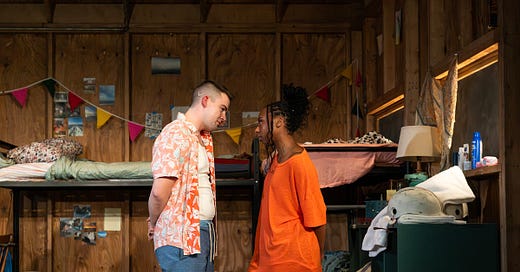Jack DiFalco and Renée-Nicole Powell. Photo: Ahron R. Foster
Experimental is one thing; inchoate another. This debut work by Eliya Smith relies on its own internal logic, which unfortunately – in contrast to Liza Birkenmeier’s brilliant 2024 play Grief Hotel – doesn’t always play out clearly for the audience.
Six campers and one counselor – Cade (Jack DiFalco), who doesn’t appear much older than his counselees – occupy a unisex cabin in the woods of Hurt, Alabama (a telling bit of overreach: the factual “Hurtsboro” isn’t quite so euphonic). Smith suggests that each teen is at a particular stage in the healing process, though she’s stingy in doling out the particulars. By minimizing backstories, she at least avoids the tone of an after-school special. Still, the script is needlessly abstruse: Smith takes forever to tease out what exactly the kids’ damages are.
Olivia (Renée-Nicole Powell), bold and brassy at 17, presents as hypersexualized in the wake of a death for which she may have been responsible. In order to determine the underlying facts, though, you may have to plumb the script, because the performers tend to mumble (perhaps in abeyance to Les Waters’s direction?) and Louise Thompson’s evocative mess of a set – you can practically sense the dustballs accumulating under those lumpy, sagging bunkbeds – tends to absorb the dialogue, despite a perfectly good sound design by Bray Poor (it’s rich with birdsong and other sylvan touches).
Olivia aggressively comes on to Cade: that’s the dominant story line, and there’s some suspense as to whether he’ll cave. Olivia’s sister Esther (Lark White) is on to her, at once empathetic and resentful. Cade does his best to fend off Olivia’s escalating advances, but it’s not much of a cliffhanger either way.
The unseen camp director, Rocky (Danny Wolohan), starts the day with overly chummy announcements over the PA. His ramblings definitely overstep: he recounts, for example, a past relationship with a woman who insisted on staying silent during sex. It’s an interesting riff – or would be in another script, from which it’s perhaps lifted – but of course totally inappropriate in context. Rocky’s matutinal musings come out of the blue, shoehorned in like possible outtakes from another, as yet larval play.
Also scattered throughout are readings-on-demand of a script being crafted by the presumably youngest camper, Blue (Maaike Laanstra-Corn). The budding playwright imagines a woman living alone in a “gigantic purple house” by the sea, where random surprise packages arrive daily. The other girls humor Blue by listening and, when conscripted, reading her scribblings aloud, but the whole notion seems like a conceit on the part of the playwright-behind-the-playwright. Are we meant to see the isolated woman as a stand-in for Blue, and Blue perhaps for Smith? The fantasy itself, pretty transparently intended to represesent the immature girl’s deracinated state of mind, is off-puttingly precious.
Olivia, the sexual aggressor, is the most believable character in the bunch, and you may end up rooting for her to sort out her maladjustment. The play as a whole, though, is so doggedly rigged, the stakes never for a moment feel real.
At the Atlantic Theater Company, to May 11




